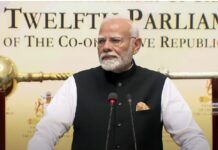A workshop on Paradigm Shift in Indian Management System was jointly organised by University Institute of Applied Management Sciences, University Institute of Engineering and Technology and PU Regional campus, Ludhiana.
Prof. Upasna Joshi Sethi extended formal welcome to speakers. She said that in current changing scenario, there is a need to understand the Indian way of doing business and paradigm shift in Indian management system.
Prof. Raj Kumar, Vice Chancellor, Panjab University in his inaugural address emphasised on research in Indian management system. He said we conduct so much research on American system but our own management system is not studied by researchers and this Indian system is so old with lot of managerial lessons which are valid till date. He further said that today’s workshop is a small small beginning in this direction and there is a long way to go.
Shri Ramashish Singh ji, Regional Organiser, Pragya Pravah, Eastern UP and Bihar while introducing the topic highlighted how Indian Scriptures like Mahabharta and Ramayana add great value to the management domain. Bhagvad Gita is a book of Psychotherapy. It is amazing to study how large events of those ancient time were organised and so many rulers use to attend. We are forgetting our values and are moving towards short term gains. Further he said that today we need value based leaders and managers those who can understand and focus on environment, human and social side of management.
Distinguished speaker of the workshop Shri Atul Kothari ji, National Secretary, Shiksha Sanskriti Utthan Nyas, New Delhi highlighted quality of management education is a challenge today. 70% students who obtain management degrees are not worth to be called as management graduates. Management education system of India should include Indian culture, nature and development in curriculum. The syllabus should be based on learnings from past keeping into consideration the present scenario. Physical, economic and human power must be integrated in it. The concepts like self-development, psychology, pollution and waste management, disaster management, human management, environmental management, health management and time management should be essential part of management education. Teaching pedagogy also needs a change. Instead of only foreign case studies, Indian cases should also be taught in business schools. He cited examples of Kumbh mela, dibba wala, Mumbai which are very successful management case studies and are developed by foreign universities. He urged Indian universities should come up with Indian industry case studies and prepare a small booklet of Indian business based case studies. As of now majority b-schools rely on theory. Practical is as important as theory, so there should be right balance between practical education and theory. More industrial visits should be included as a part of teaching pedagogy. Yoga is part of few corporates now but not all. Corporates are realising the importance of Yoga as a tool for stress managmement. We need to work on ancient knowledge in management education so as to produce managers who are equipped with team working skills, time management skills, values and ethics and who can understand human and social aspects. Developed countries like Japan also teaches management lessons from Gita and Ramanyana. Our literature including Chanakya, Shivaji, Ramayana and Mahabharta has given priority to values. Nodoubt the studies have been there but these are studies separately. There is a need to integrate these lessons so as to produce one course. Further, he said that creativity can be fostered if courses are made and taught in mother tongue .
Prof. S. K. Dubey, Director, Institute of Management Studies, BHU in his address compared management practices of 1980s and 90s with present time. He said that companies now are dealing with informed customers so it becomes important to understand consumer psychology. Innovative culture is gaining importance.
Dr. H. Anand, Economic Advisor, Vardhman Group, Ludhiana shared best industrial practices and urged management institutes to focus on value based education.
Lord Diljit Rana, MBE, Baron of Malone, Member House of Lords, UK, shared his experiences of Western and Indian management system. He said due to ethics and values that were taught in India he was able to contribute in bringing peace in Northern Ireland. So Indian management system must work on improving transparency, commitments, ethical leadership.
Dr. Monika Aggarwal, Assoicate Porfessor, UIAMS, Prof. Ravi Inder Singh, Director, PU Regional Campus, Ludhiana and Prof. Sakshi Kaushal, Professor, UIET were the main organisers of the Workshop.

















